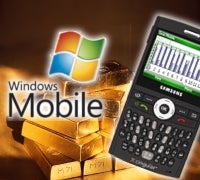 |
While Apple and Google grab most of the smartphone headlines for the iPhone and G1, respectively, Microsoft has quietly gone about the business of expanding the already sprawling ecosystem around its own Windows Mobile software.
“One thing we get asked a lot by media and analysts is ‘What’s going on with Windows Mobile?'” said Scott Rockfeld, Microsoft’s (NASDAQ: MSFT) group product manager for Windows Mobile.
In response, Rockfeld and Microsoft can point to the fact that Windows Mobile-based devices continue to proliferate, even while Google’s big plans for Android loom.
“We’ve launched thirty new Windows mobile since Google (NASDAQ: GOOG) announced Android,” he said.
While the year-old Apple (NASDAQ: AAPL) iPhone continues seeing meteoric growth — it now controls 17 percent of the smartphone market by some estimates — and is praised for making the mobile Web more accessible, Rockfeld argues Windows Mobile devices offer more choice.
“If you’re a photographer, we have phones with much better cameras. If you want a real QWERTY keyboard, we have that,” he said. “It comes down to personal choice.”
As for offering advanced features — an increasingly important selling point for high-end phones — he points to several recent unveilings. Last week, for example, AT&T and Samsung released the Windows Mobile-powered Samsung Epix that incorporates optical mouse technology to supplement its advanced touchscreen interface. The built-in stylus offers better accuracy when making selections, though users can also use a simple swipe of the finger. The Epix also includes a QWERTY keyboard for typing.
An additional new Windows Mobile device, the Samsung Omnia, includes a five-megapixel camera with “smile recognition” technology designed to help capture the right facial expression, while another new model, the HTC Touch Diamond, includes videoconferencing features.
Rockfeld won’t comment on rumors of Windows Mobile 7 — a major upgrade to the software being planned. But he insists there’s plenty of major innovation being done in devices based on the current Windows Mobile, version 6.1.
“We haven’t announced anything about our mobile roadmap, but we’re always working on future versions,” Rockfeld told InternetNews.com. “We’re happy to get 6.1 phones out there now and through the holiday season.”
Rockfeld said Microsoft would be ready to start talking about future versions of its mobile OS next year.
Beyond features
Microsoft also doesn’t shy away from touting the more than 19,000 applications available on its platform, compared to the 5,500 offered by the Apple iPhone store, as of last week. The Android Market application store launched on Monday with 50 to 60 available downloads.
Rockfeld also described Windows Mobile as a success in terms of the number of manufacturing partners it has (56 worldwide) and the number of developers it’s attracted (numbering in the thousands.)
Many of those relationships were built over time, and he expects Google will go through a learning curve of dealing with multiple partners.
“Google will have to prove to them it can offer mutually beneficial relationship,” he said. “Partnerships aren’t always love at first sight.”
One hurdle that Rockfeld sees is that the Android initiative is more about promoting Google’s services, noting users are required to activate Google’s Gmail service.
But while a Google spokesperson agreed that T-Mobile’s G1 includes a lot of Google products, they said it also offers access to other services. They also said the system’s log-in requirement is designed to make it easier for users to get started right away.
Google also said its well on its way to striking key partnerships beyond its deals with T-Mobile — the G1’s exclusive U.S. carrier — and the G1’s Taiwanese manufacturer, HTC.
“Working with industry leaders is a crucial component of our mobile strategy,” the spokesperson told InternetNews.com. “We’ve forged relationships with some of the most prominent carriers and equipment manufacturers in the world, in some of the most strategically important markets in the world.”
Who wins the smartphone race?
Even with Google and Apple joining the fray among established device players like Microsoft, Nokia and BlackBerry maker Research in Motion, the smartphone industry may be poised to have multiple winners.
Industry analyst Tim Bajarin said he expects over 65 percent of mobile phones sold in the U.S. will be smartphones by 2012 — up from around 10 percent today.
“The demand for smartphones is going to rise for Apple as well as Windows Mobile, Symbian, Android, BlackBerry and others,” he said. “The growth is going to be explosive.”
Bajarin said he believes Windows Mobile isn’t getting the attention of the iPhone and others because it’s largely been optimized for the enterprise.
“Windows Mobile is already a very powerful platform,” he said. “Whatever Microsoft does with the OS going forward has to appeal to a much broader audience.”


